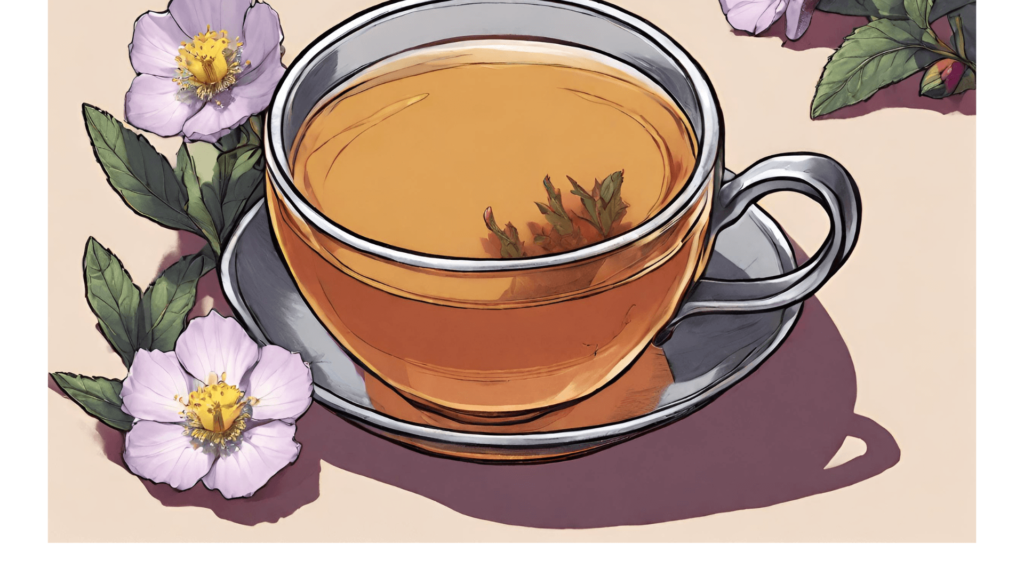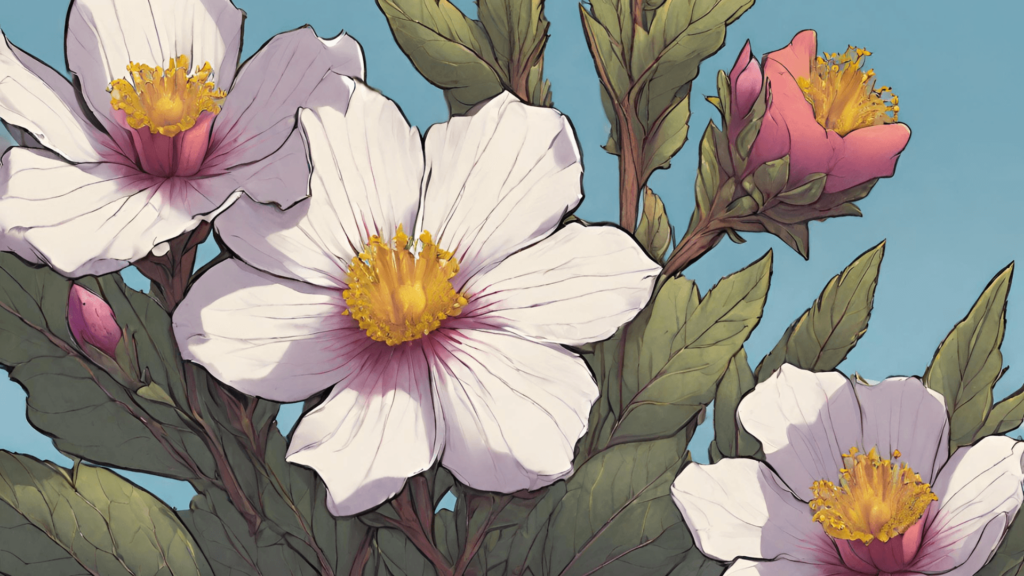7 Astonishing Health Secrets of Cistus Tea Revealed

In this article, we will answer your cistus and cistus tea questions:
Does Cistus help with the following?
- Lymes Disease
- Retro Viruses
- Skin Irritations
- Dental Plaque
- Immune System
- Digestion
- Fungal Infections
- Parasites
What is Cistus?
The cistus plant is an evergreen shrub that thrives in the Mediterranean area.
Some of the best and most potent cistus tea comes from Greece and Spain.
Cistus is also known as Rock Rose.
It is called Rock Rose because it grows well in rocky, dry regions, where its flowers grace the landscape.
It produces health-promoting polyphenols in great numbers due to its ability to thrive in these dry, rocky conditions.
What’s more, for the plants to thrive in that harsh sun, they must produce protection in the form of these polyphenols.
This is, in turn, a wonderful gift to humans who require an anti-oxidant and anti-inflammatory boost.
Let’s get into some of the specific health benefits Cistus may address.
We will look at medical studies for each potential benefit.

Lyme Disease | Tick Repellant | Cistus Tea
A Johns Hopkins Public Health Department professor found several herbs capable of dismantling certain Lyme bacteria.
Among those herbs was cistus.
One way I would protect myself if I lived east of the Mason-Dixon line or in any state where ticks are an issue would be to drink freshly brewed cistus tea.
Cistus is a repellant for these ticks.
Cistus, along with active botanicals like Skull Cap, plays a role in repelling vector-borne disease.
TOP 3 TICK REMEDIES
If already infected with Lyme disease, I would drink this tea often and take cistus tinctures.
On top of Cistus tea and tinctures, implore Japanese Knotweed tinctures and utilize monolaurin pellets.
Lyme disease can be a bit stealthy, and I believe most people have some form of Lyme infection without knowing it.
It can easily be misdiagnosed.
With over 1 million cases in the USA that have been documented, I suspect there is more than that from my studies.
It has likely touched almost all of the population by now.
Ticks are not the only sources of lyme.
You can get it from stinging spiders as well.
What’s more, cat flees carry Bartonella and many retroviruses with lifelong consequences.
The feline leukemia virus is a retrovirus.
These viruses live in their feces and in flees.
This live viral material is alive for days and can spread to you.

Brewing a Strong Cistus Tea
A few vital points to address when brewing cistus tea:
- Choose a high-quality source
- It is best to incorporate cistus with the flowers, leaves, and stems
- Brew it twice to unlock all the polyphenols, bioflavonoids, and proanthocyanins.
- Add organic whole-leaf rebaudiana stevia for more immune-boosting effects while adding a pleasant taste.
Cistus Tea for Retroviruses
Retroviruses use your RNA to store and transmit genetic material inside your body.
Your RNA then carries the instructions to keep making those virus particles.
This is then integrated into your DNA.
It can cause tumors and significant immune system challenges.
Here are some symptoms linked to Retroviruses.
Remember that these symptoms may not be related to your issue but can also be caused by another problem.
- Chronic Cough
- Tinnitus
- Memory decline
- Eye sight decline
- Body Pain
- Neurological Pain
- Facial Pain
- Sciatica
- Tumor growth
Because HIV contains reverse transcriptase, it is classified as a retrovirus.
This study shares findings that Cistus tea may be helpful for retroviruses such as HIV.
The study shares how vital the polyphenols from cistus tea are in attacking HIV retrovirus signaling.
I also found this study compelling evidence of cistus tea in the case of targeting viral enveloping proteins.
More on Viruses and Cistus
In this study we see promise for cistus against herpes and avian flu viruses.
The polyphenol content in cistus is about three times more than in red wine.
Cistus even shows to be a potential natural remedy for fungal infections.

Dental Plaque and Cistus Tea
If you have oral health challenges, one of my favorite mouthwashes is one with cistus extract.
It can help with gum issues and keep the mouth clear of harmful bacteria.
I have seen it break down biofilms and help to whiten teeth naturally.
Take a look at this medical study on biofilms and cistus.
Reducing oral bacteria with cistus can be a massive player in your ability to keep a healthy digestive system.
Parasites and Cistus
I like to gargle with cistus to prevent parasites and bugs from feeding on food particles well after they have been digested.
This will lessen food for them to feast on and keep your body a bit cleaner from these inevitable bugs we live with today.
This, in turn, improves overall digestion and the digestive system.
Parasites and unevolved bacteria love to hide in these biofilms.
The goal is to keep the good bacteria around 80% of your internal ecosystem and 20% opportunistic at your best.
Cistus tea has been known to be a helper in these types of parasitic infections.

Cistus Skin Healing Booster
With anti-inflammatory and wound-healing properties, cistus may benefit skin irritations and premature aging.
You can find cistus as an essential oil under the name Rock Rose.
This can be a great addition to your skin regime.
Add a few drops of cistus, or rock rose, essential oil to your favorite carrier oil and apply to the area of the skin you want to target.
Cistus may offer skin benefits such as toning, diminishing fine lines, and being an antiseptic in the case of acne.
Cistus may also help heal wounds, such as burns or cuts.
You can see more information in this article on Cistus for wound healing.
Cistus massage oil can help move the lymphatic system and assist drainage.
This promotes better circulation and less puffiness in general.
Cistus as an Immune System Booster
Cistus tea can help the immune system defend itself.
Because it grows in harsh conditions, the plant must work hard to protect itself from intense sun exposure.
As we stated earlier, it creates more significant amounts of substances like polyphenols.
This translates to a healthier, more robust immune system.
With its antiviral and antimicrobial properties, it helps remove some of the heavy lifting from your immune system.
Cistus Tea Common Questions
Are there Side Effects of Cistus Tea?
I have taken cistus tea myself regularly, and I do not notice any adverse effects.
In this medical study, it says there are no known toxic side effects of cistus.
What Does Cistus Taste Like?
To me, it has an astringent taste. I usually drink it plain as a medicinal type of tea; however, sometimes adding some whole-leaf rebaudian stevia adds both sweetness and immune-boosting effects.
How much Cistus Tea Should I Take?
I have heard some Doctors recommend up to 6 cups per day for those with Lyme disease.
However, you need to consult with a medical doctor before adding cistus to your regimen.
What is Cistus Also Known as?
Cistus is also known as Rock Rose.
What is The Best Cistus?
The best cistus comes from its native lands.
This would be areas such as Greece and Spain.
Wild, Organic, and Sustainably harvested are vital factors to look at.
Also, try to find cistus with flowers, leaves, and stems to get the whole array of healing properties.
Cistus Tea Conclusion
This post was all about cistus and cistus tea.
It has some compelling evidence from the medical studies linked throughout this post.
If you have dental plaque, gingivitis, periodontitis, or gum inflammation, you may want to consider using a cistus mouthwash.
Cistus tea gargling can help with keeping the germ load and parasites at bay.
In the case of tick bite prevention and Lyme disease, it is an excellent natural remedy to ward off ticks and spiders.
If you already have Lyme, it may be beneficial to consult a Doctor to see how cistus tea may help keep the viral load down.
We also discussed Cistus as a potential remedy for skin issues like acne, cuts, and burns to promote better circulation and beautify the skin.
Cistus tea plays a crucial role in boosting the immune system and is one of my favorite wellness teas.
Cistus works to boost the immune system and may discourage viral replication.
So, what do you think of Cistus and Cistus tea?
Has it helped you at all?
Please share this cistus post with those you feel could benefit from it.
POPULAR POSTS







